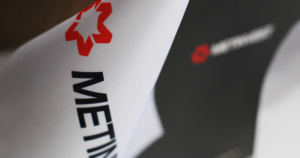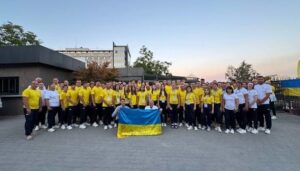
Metinvest B.V. (Netherlands), the parent company of the mining and metallurgical group Metinvest, increased its EBITDA by 11% in 2024 compared to 2023, to $957 million, according to updated data published in its annual report.
According to the report, EBITDA in the metallurgical segment grew by 82% to $289 million, while in the mining segment it remained unchanged at $768 million.
At the same time, it is specified that last year, corporate overhead costs and eliminations amounted to $100 million (in 2023 – $68 million). As a result, in 2024, the mining segment’s share in the group’s EBITDA (excluding corporate overhead costs and eliminations) was 73% compared to 83% in 2023, while the metallurgical segment’s share last year increased to 27% compared to 17% in the previous year.
The growth in the group’s EBITDA was primarily due to an increase in sales of own iron ore products, as well as billets and long products, operational improvements, the positive impact of the hryvnia’s depreciation against the US dollar on costs, increased efficiency at both joint ventures, lower raw material costs due to lower prices for coal, coke, and iron ore, and reduced purchases of third-party raw materials for rolling mills.
These factors were partially offset by lower sales prices, higher overall logistics costs, primarily due to increased sea shipments from Ukraine to distant markets, and higher energy costs, primarily due to higher electricity costs.
In 2024, the Group’s EBITDA margin was 12% (unchanged from 2023). The EBITDA margin of the mining segment was 20% (down 6 percentage points (pp) compared to 2023), while the EBITDA margin of the metallurgical segment was 6% (up 3 pp).
In 2024, net cash used in investing activities amounted to $197 million, down 34% from 2023. The total amount of cash used to acquire property, plant, and equipment and intangible assets decreased by 29% to $216 million. Interest income doubled to $13 million, while proceeds from the sale of property, plant, and equipment and intangible assets decreased slightly to $6 million.
In 2024, net cash used in financing activities amounted to $241 million, compared to $115 million in 2023. Net repayment of loans and borrowings amounted to $216 million (in 2023 – $185 million), mainly due to bond redemptions. Net trade financing amounted to $25 million, compared to $70 million a year ago.
In 2024, Metinvest adhered to a fairly balanced investment policy, dictated by wartime restrictions in Ukraine and the need to decarbonize the European steel industry. Investments in Ukraine were primarily directed toward employee safety, ensuring the availability and operation of critical equipment, strengthening energy resilience, and complying with environmental standards at the companies.
In addition, particular attention was paid to resolving logistical issues. Although most large strategic projects remained frozen, Metinvest launched a new project to concentrate enrichment waste at the Northern GOK. It aims to reduce waste volumes, lower operating and capital expenditures, and minimize environmental impact while maintaining production volumes.
At the same time, the group is also preparing for the country’s post-war recovery. Outside Ukraine, Metinvest is working on the Adria project to build a low-carbon steel plant in Italy.
The group’s total capital expenditures decreased by 17% to $235 million. Approximately 83% of this amount was allocated to maintenance projects and 17% to strategic projects.
Metinvest increased the capacity utilization of most of its enterprises. This was an important achievement for the group, given the prolonged impact of the war. The resumption of shipping in the Black Sea played a decisive role in our work. This ensured a reliable export route and allowed us to increase delivery volumes. At the same time, significant challenges remained. Throughout the year, power outages had a negative impact on profitability. In addition, despite incredible resilience throughout most of the year, the approaching front line forced us to gradually suspend operations at the Pokrovsk Coal Group,” said Yuriy Ryzhenkov, CEO of the group, in the report.
As reported, Metinvest’s consolidated net loss in 2024 increased sixfold compared to 2023, to $1.152 billion from $194 million, while revenue rose to $8.050 billion from $7.397 billion.
Metinvest is a vertically integrated group of mining and metallurgical companies. Its enterprises are located in Ukraine, in the Donetsk, Luhansk, Zaporizhia, and Dnipropetrovsk regions, as well as in the European Union, the United Kingdom, and the United States. The main shareholders of the holding company are the SCM Group (71.24%) and Smart Holding (23.76%). Metinvest Holding LLC is the managing company of the Metinvest Group.

The Ukrainian team won 23 medals (5 gold, 8 silver, and 10 bronze) and took 10th place in the overall standings at the 2025 European Youth Olympic Festival, which took place in Skopje (North Macedonia).
“This is Ukraine’s second most successful performance in the history of its participation in the Festivals since 1993! The blue and yellow team won more medals only in 2019, when it won 25 awards (8 gold, 7 silver, and 10 bronze),” the National Olympic Committee reported on its Telegram channel on Sunday.
A total of 78 young athletes in 12 sports represented Ukraine at the EYOF 2025. “This year, Ukrainians climbed the podium in seven sports. Judo: 2 gold, 1 silver, 3 bronze. Swimming: 2 gold, 2 silver, 1 bronze. Athletics: 1 gold, 1 silver, 2 bronze. Taekwondo: 2 silver, 1 bronze. Shooting: 1 silver, 1 bronze. Artistic gymnastics: 1 silver, 1 bronze. Table tennis: 1 bronze,” the report said.

Agroholding Agrotrade has already threshed over 2,500 hectares, which is 14% of the total plan for early crops, with the largest areas processed in the Kharkiv and Sumy regions, the agroholding’s press service reported on Facebook.
Agrotrade reminded that in the 2025 season, winter wheat accounts for 85% of the harvest structure, and winter rapeseed accounts for 15%.
“In the Kharkiv region, winter wheat yields have been reduced due to frosts, but the Sumy and Chernihiv regions are gradually evening out the overall picture. We started harvesting on drier plots and expect higher yields on later varieties. Overall, we expect to meet the plan with a slight overrun. Winter rapeseed yields average about 3.5 tons per hectare — despite the weather, the results are in line with expectations,” said Oleksandr Ovsyanyk, director of the agro-industrial department at Agrotrade.
According to him, the best results are in Chernihiv region, where rapeseed yields are 111% of the plan, and in Kharkiv region, where winter wheat yields in some fields are over 5.4 tons/ha, so the plan is being met at 106%.
The Agrotrade Group is a vertically integrated holding company covering the entire agricultural cycle (production, processing, storage, and trade of agricultural products). It cultivates over 70,000 hectares of land in the Chernihiv, Sumy, Poltava, and Kharkiv regions. Its main crops are sunflower, corn, winter wheat, soybeans, and rapeseed. It has its own network of elevators with a total storage capacity of 570,000 tons.
The group also produces hybrid seeds of corn, sunflower, barley, and winter wheat. In 2014, a seed plant with a capacity of 20,000 tons of seeds per year was built on the basis of the Kolos seed farm (Kharkiv region). In 2018, Agrotrade launched its own brand, Agroseeds.
The founder of Agrotrade is Vsevolod Kozhemyako.

US President Donald Trump and European Commission President Ursula von der Leyen have reached a historic trade agreement that prevents the introduction of planned US-European tariffs on August 1 and establishes new rules for trade relations between the world’s two largest economies.
The US will impose a single tariff of 15% on most goods from the EU instead of the previously announced 30%. The exceptions are steel and aluminum, for which the tariff will remain at 50%.
In return, the EU commits to:
purchase $750 billion worth of energy from the US;
increase direct investment in the US economy by $600 billion;
purchase a significant amount of US weapons.
The negotiations took place in Scotland, at Trump’s golf course in Turnberry. After the meetings, strategists from both sides rushed to finalize the agreement, as multiple tariff measures of up to 50% were due to take effect on August 1.
Both sides acknowledged the compromise: Trump called it “the greatest deal ever made,” while von der Leyen stressed that it would bring stability and predictability for businesses in the EU and the US.
The agreement eases trade tensions between the US and the EU, which intensified after a series of tariff threats in the spring of 2025 — including car tariffs (25%) and corresponding EU measures of up to 25% on $21 billion worth of imports from the US. The principle of “mutual concessions”: the EU agreed to a 15% tariff and in return opened its energy and investment markets to the US.
Although some sectors, such as the European automotive and pharmaceutical industries, are awaiting further clarification, the agreement brings the parties closer together and reduces the risks of an escalating economic war.
The agreement between Trump and von der Leyen was a key milestone in US-EU trade relations in 2025. It locks in a 15% tariff, opens up opportunities for billions in US purchases and EU investments, and lays the foundation for long-term stability. Despite some restrictions (such as steel tariffs), the agreement provides the necessary economic predictability for both sides and reduces the risk of a transatlantic trade war.

An overview of the property tax system in Poland for foreign citizens and expats
Interest in Polish real estate among foreigners, including Ukrainian expats, continues to grow. At the same time, it is important to consider the tax burden associated with both the purchase and ownership and sale of a home. In this article, we will look at the key taxes related to real estate in Poland, as well as the current rates and features for individuals.
– Tax on the purchase of real estate: tax on civil law transactions (PCC)
When purchasing secondary real estate (from a private individual), the buyer is required to pay PCC at a rate of 2% of the property value.
Example: an apartment for €100,000 — the tax will be €2,000.
If the property is purchased on the primary market (from a developer), PCC is not payable, but VAT is charged (usually 8% or 23% depending on the type of housing and area).
Up to 150 m² for an apartment or 300 m² for a house — 8% VAT
Above these limits — 23% VAT on the excess
The purchase is accompanied by notary fees: drawing up the agreement, entry in the land register, registration fees. The average amount of additional costs is about 2–4% of the purchase price.
– Property tax (Podatek od nieruchomości)
This is an annual local tax paid by every property owner. It is determined at the commune (municipality) level and depends on the size of the property.
Maximum rates in 2025 (set annually by the Polish Ministry of Finance):
Apartments and houses: up to PLN 1.15 per m² (≈ €0.27)
Land plots for residential purposes: up to PLN 0.70 per m² (≈ €0.16)
Example: a 60 m² apartment in Warsaw → tax ~ €16 per year.
Important: the rate is lower in small towns and closer to the maximum in the capital.
– Tax on rental income
If the property is rented out, the income is taxable. Individuals can choose one of the following schemes:
Market rate (general PIT scale): 12% up to PLN 120,000 of income per year and 32% on the excess (2025)
Flat rate (ryczałt): 8.5% on income up to PLN 100,000 and 12% on the excess
The ryczałt regime is popular among small landlords, especially for short-term rentals.
– Capital gains tax (on sale)
When selling real estate earlier than 5 years after its acquisition, there is an obligation to pay 19% capital gains tax on the profit.
Exceptions:
The tax is not payable if the seller has owned the property for 5 years or more.
Exemption is also available if the entire amount is used to purchase a new home or for construction within 3 years.
– Other costs and fees
Property maintenance: utility bills, repair and management fees (especially in residential complexes)
Garbage collection fee: set by the municipality, depends on the number of residents
Management company fees: from PLN 2 to PLN 4/m² per month (€0.5–1/m²)
The Polish real estate taxation system is moderate and relatively transparent. Particular attention should be paid to the PCC tax when purchasing and the obligation to pay capital gains tax when selling. For foreign investors and relocators, it is important to take into account the total tax burden in advance when planning a purchase or lease.
relocation.com.ua recommends consulting a Polish tax advisor or lawyer before entering into a transaction to avoid unexpected costs and optimize the tax consequences.

Ukrainian Prime Minister Yulia Sviridenko has linked the previously launched audit of government spending to deregulation and the moratorium on interference in business.
“In the economy, we have launched the implementation of the National Security and Defense Council’s decision on a moratorium on business inspections by law enforcement agencies. Business expects tangible steps from the government towards deregulation. Therefore, we are starting an audit of all government spending.
We plan to significantly reduce bureaucratic procedures,” Svyrydenko wrote on Facebook on Sunday morning.
She also said that she is currently meeting with each minister and working with them on specific plans that will be included in the government’s action program.
As reported, on July 23, Ukrainian President Volodymyr Zelensky signed a decree to reduce bureaucratic procedures and conduct an immediate audit of government spending. He expects the government to report back within a month so that maximum state resources can be directed toward defense. He also announced “tangible steps toward deregulation to give people more freedom.” The relevant decree No. 544/2025 was published on the president’s website.
On the same day, the Cabinet of Ministers of Ukraine approved a plan to implement the decision of the National Security and Defense Council on a moratorium on unfounded inspections and interference in business, among other things, instructing
the State Regulatory Service and ministries to submit proposals for deregulation and reduction of unnecessary permits within a month. “From July 24, the tax and customs authorities will limit inspections for low-risk enterprises. The exception is high-risk industries, such as the turnover of excisable goods, where control is necessary,” Svyrydenko wrote on Telegram.
According to her, by October 21, law enforcement agencies must agree on measures to identify assets subject to sanctions and ensure their return to the budget for defense and recovery needs.
“The plans include the launch of a digital control system and a quarterly review of the effectiveness of decisions,” Svyrydenko added.
She also noted that the government will prepare amendments to the Criminal Procedure Code (CPC): only the prosecutor general or regional-level officials will be able to open new proceedings against businesses.